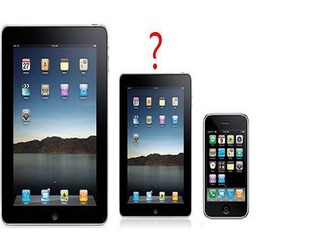
Forsooth, Steve Jobs was wrong about 7-inch screens?
More reports emerge pointing to Apple's about-face on the absurdity of 7-inch tablets

The Web grapevine is all abuzz over rumors that Apple will be releasing a smaller iPad soon, based on more reports from Bloomberg and now the Wall Street Journal that Apple’s component suppliers in Asia have received orders to mass produce tablets with smaller screens (sorry about the two metaphors in one sentence thing). Does this mean that Apple is recanting its former position on the absurdity of a seven-inch screen?
Unnamed insiders are saying that the new iPad screens will be smaller than eight inches, and that Apple is working with LG Display Co. in South Korea and AU Optronics Co. in Taiwan. But if you recall, in fall 2010, Steve Jobs made a bizarre surprise appearance on an Apple earnings call to skewer Google and the slew of Android tablets that were flooding the market following the iPad’s debut. During that earnings call, Jobs mocked the idea of a seven-inch screen and joked that the seven-inch tablets would need to be sold with sandpaper. “Why?” you ask. “So that the user can sand down their fingers to around one-quarter of their present size,” said Jobs.
Gross visuals aside, Jobs claimed that Apple user tests showed that smaller tablets just don’t work. “There are clear limits of how close you can physically place elements on a touchscreen before users cannot reliably tap, flick, or pinch them,” he explained.
He went on to point out that there’s just no point to a seven-inch tablet when most tablet owners also have a smartphone, which allows them to do pretty much anything they’d be able to do on a baby tablet screen.
But Apple may be seeing the advantages of a seven-inch screen after rivals Amazon and Google released fairly successful seven-inch tablets. Obviously, last year Amazon released the Kindle Fire, and last week Google revealed its own branded tablet: the Nexus 7, which has been getting some pretty positive reviews.
Those examples follow some other less successful cases, like the RIM PlayBook, which only shipped some 260,000 units last year.
While the seven-inch screen translates to lower costs, in some cases (like the PlayBook and even the Kindle Fire to a certain extent), it’s also translated to slower systems and rougher UIs. But where the iPad has been prohibitively expensive for many people, the Kindle Fire and the Nexus 7 are stepping in as worthy alternatives.
Total global tablet shipments are expected to reach 124 million units this year, according to IHS iSuppli. That’s a 90% increase over 2011, when 65 million tablets were shipped worldwide. Apple is expected to claim a 61% market share for the full year of 2012, which is a 1% drop from last year.
Image source: iphoneappfreelancer.com
Related News


New iPad mini could debut by the end of the year

Is a $300 iPad Mini around the corner?

